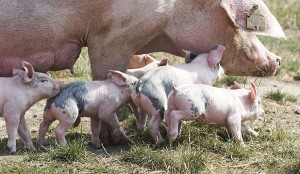CHINA - Malcolm Moore writes that major foreign investors are making a shrewd commodity play by buying into the pork industry.
An expected call from Goldman Sachs could change 59-year-old pig farmer, Zou Changkui's(who resides in the southern Chinese city of Longyan) life forever.
"I heard they have bought a lot of pig farms in Nanping, but they have not approached me yet," he said. But he has not lost hope. "If they want to buy my farm, I would say yes - providing we have a win-win agreement."
According to the Telegraph, the US investment bank has sent ripples through the Chinese pork industry after reportedly spending between £150m and £200m this month on a series of hoggeries in Fujian, Jiangxi and Hunan, the heart of China's green belt.
It may be an unorthodox investment, but Goldman Sachs is not the only major bank on the hunt for hogs. Last year, Deutsche Bank launched the DWS Global Shennong Fund specifically to invest in agriculture.
Jiang Hua, the chief executive of Hongbo, an enormous Shanghai-based pig farm, said the German bank wanted to buy a 30 per cent stake for £30m. Deutsche Bank is reportedly spending a similar amount for a slice of Baodi, a Tianjin hoggery.
Wang Chao, a 22-year-old from Jingyang, near Xi'an, said he had given up his college place to become a pig farmer. "I can sell one pig for 1,200 yuan or even 1,300 [more than £80]," he said. "The people I knew who graduated from my course were earning 1,500 a month."
Companies such as Agfeed, China's largest pig farmer, are declaring record profits. Two weeks ago, Agfeed, which is listed on the Nasdaq exchange, posted a 619 per cent rise in net profits for the second quarter of this year to £4.2m. "The Chinese population enjoys pork no matter what economic cycle the world is in," it noted dryly.
The company's strategy is to take advantage of an enormous restructuring of the pig farming industry, buying up small farms and merging them to form a huge, streamlined conglomerate. Traditionally, pigs were kept by every family and even now three-quarters of the country's swine are spread among micro-farms.
Li Songyan, the chairman of Agfeed, promised to buy at least four more farms in the second half of the year. "The hog shortages throughout China are presenting us with historical 'land-grabbing' growth opportunities," he said.
At least 600 medium-sized farms are potential acquisitions. Agfeed is determined to buy as many as possible, lifting its herd size from 400,000 to a hoped-for 1m. In April, the company snapped up 16 farms, paying from £500,000 to £3m each, depending on their size.
Agfeed said Goldman Sachs had noticed the opportunities being thrown up as the market restructures. "Our pig farming market is like the US in the 1960s or 1970s, with lots of small backyard mom-and-pop producers. There is a great opportunity to make money from scaling these operations up, but the entrance of these big foreign firms will mean more competition for us."
Goldman Sachs controls Shuanghui and Yurun, China's two largest meat-processing companies. Wilmar International, the Singaporean company which has more than 50 per cent of China's cooking oil market, has let prices triple in the past year, provoking widespread complaints.
Back in Longyan, Zou said he is "ready to retire" and wants to be bought out. But he had a warning for the foreign companies hoping to make a fortune. "Fujian has a good climate for pigs, they survive best here. But you have to manage your staff closely, because they are mostly poorly educated farm boys with no ambition. That's why medium-sized farms, not big ones, are most profitable," he said.













